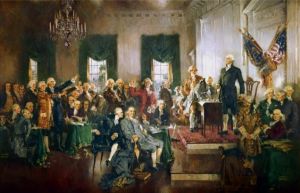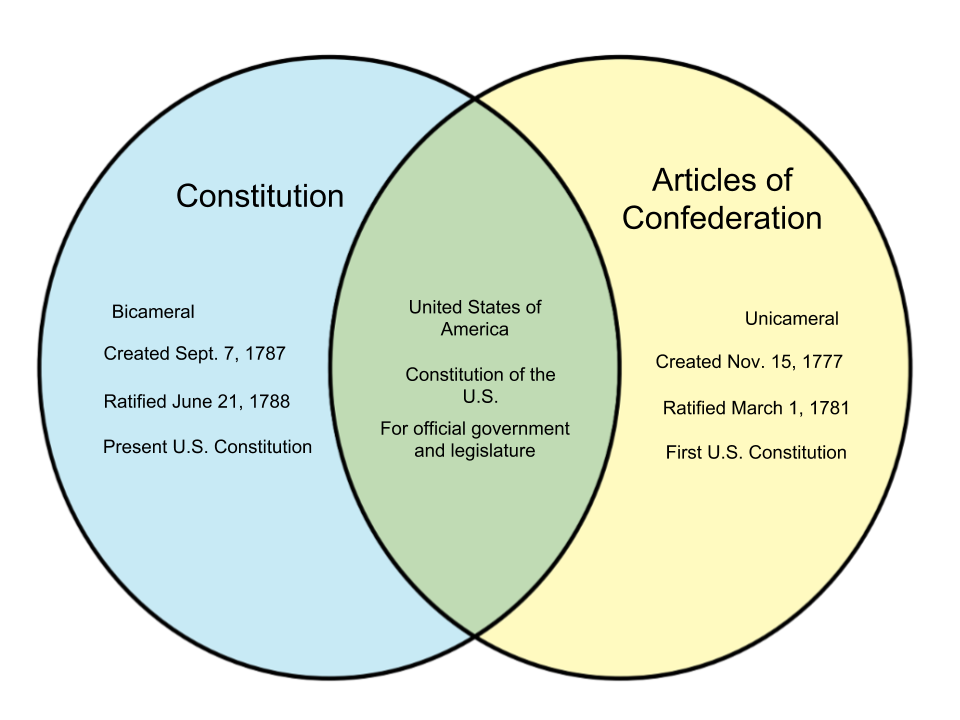Difference between revisions of "Difference Between the Constitution and Articles of Confederation"
| (8 intermediate revisions by 2 users not shown) | |||
| Line 1: | Line 1: | ||
[[File:Usa-1779925 1920.jpg|thumb|right]] | [[File:Usa-1779925 1920.jpg|thumb|right]] | ||
Both the constitution and articles of confederation were created by the same people, with a similar purpose yet different design and approach. In this article, we will highlight the differences between the constitution and articles of confederation. | Both the constitution and articles of confederation were created by the same people, with a similar purpose yet different design and approach. In this article, we will highlight the differences between the constitution and articles of confederation. | ||
| + | |||
| + | === Constitution === | ||
| + | The Constitution is the present constitution being used in the United States of the America. It is the second constitution, replacing the Articles of Confederation. It began on September 17, 1787 and was eventually ratified on June 21, 1788. The Constitution operates with a bicameral legislature that is referred to as the Congress - it is divided into the House of Representatives and the Senate. The Congress allows up to two Senators per state, and Representatives depending on the population of the state they represent. The Constitution has constantly been subject to many changes and amendments. It currently presents 27 amendments and 7 articles, but is still one of the shortest constitutions in existence. | ||
| + | penis | ||
| + | |||
| + | === Articles of Confederation === | ||
| + | |||
| + | The Articles of Confederation was the constitution which preceded what is now known as the U.S. Constitution, or simply the Constitution. It was primarily created in order to help the original American colonies in leveraging or requesting assistance from foreign governments. Prior to this, the thirteen colonies did not have a sovereign authority and thus were in need of both domestic solidarity and foreign assistance. The Articles of Confederation were then created on November 15, 1777 and ratified on March 1, 1781. It was the Articles of Confederation that named the nation formally as the “United States of America.” It contains 13 articles. Despite its role in history, however, many found that the Articles lacked a sufficient central authority, judicial branch, as well as an established executive power. There were various issues and loopholes as well, and the Articles were eventually replaced by the U.S. Constitution. | ||
| + | {| class="wikitable" | ||
| + | |- | ||
| + | ! !! Constitution !! Articles of Confederation | ||
| + | |- | ||
| + | | Definition || Also known as the U.S. Constitution, the present constitution used by the United States of America || The first constitution of America, preceding the present constitution | ||
| + | |- | ||
| + | | Date of creation || September 7, 1787 || November 15, 1777 | ||
| + | |- | ||
| + | | Date of ratification || June 21, 1788 || March 1, 1781 | ||
| + | |- | ||
| + | | Legislature || Bicameral, called the Congress (consisting of the Senate and House of Representatives) || Unicameral, called the Congress | ||
| + | |- | ||
| + | | Members of the Congress || Up to two Senators per state; Representatives dependent on the population of their state || Two to seven members per state | ||
| + | |- | ||
| + | | Voting mechanics || One vote per Senator or Representative || One vote per state | ||
| + | |- | ||
| + | | Appointment of members || Representatives by popular vote; Senators by state legislatures || Appointed by state legislatures | ||
| + | |- | ||
| + | | Leaderships in legislature || Chair - Speaker of the House of Representatives; Vice President becomes President of the Senate || Chair - President of the Congress | ||
| + | |- | ||
| + | | On new articles || Based on agreement of the Congress || Based on agreement of nine states (Canada - special exemption) | ||
| + | |- | ||
| + | | On amendments || Based on agreement of ¾ of all states || Based on agreement of all states | ||
| + | |- | ||
| + | | Taxation || Laid/collected by the Congress || Apportioned by the Congress and collected by the states | ||
| + | |} | ||
=== Venn Diagram === | === Venn Diagram === | ||
[[File:Difference-Between-Constitution-and-Articles-of-Confederation.png|center]] | [[File:Difference-Between-Constitution-and-Articles-of-Confederation.png|center]] | ||
Latest revision as of 14:14, 17 August 2021
Both the constitution and articles of confederation were created by the same people, with a similar purpose yet different design and approach. In this article, we will highlight the differences between the constitution and articles of confederation.
Constitution[edit]
The Constitution is the present constitution being used in the United States of the America. It is the second constitution, replacing the Articles of Confederation. It began on September 17, 1787 and was eventually ratified on June 21, 1788. The Constitution operates with a bicameral legislature that is referred to as the Congress - it is divided into the House of Representatives and the Senate. The Congress allows up to two Senators per state, and Representatives depending on the population of the state they represent. The Constitution has constantly been subject to many changes and amendments. It currently presents 27 amendments and 7 articles, but is still one of the shortest constitutions in existence. penis
Articles of Confederation[edit]
The Articles of Confederation was the constitution which preceded what is now known as the U.S. Constitution, or simply the Constitution. It was primarily created in order to help the original American colonies in leveraging or requesting assistance from foreign governments. Prior to this, the thirteen colonies did not have a sovereign authority and thus were in need of both domestic solidarity and foreign assistance. The Articles of Confederation were then created on November 15, 1777 and ratified on March 1, 1781. It was the Articles of Confederation that named the nation formally as the “United States of America.” It contains 13 articles. Despite its role in history, however, many found that the Articles lacked a sufficient central authority, judicial branch, as well as an established executive power. There were various issues and loopholes as well, and the Articles were eventually replaced by the U.S. Constitution.
| Constitution | Articles of Confederation | |
|---|---|---|
| Definition | Also known as the U.S. Constitution, the present constitution used by the United States of America | The first constitution of America, preceding the present constitution |
| Date of creation | September 7, 1787 | November 15, 1777 |
| Date of ratification | June 21, 1788 | March 1, 1781 |
| Legislature | Bicameral, called the Congress (consisting of the Senate and House of Representatives) | Unicameral, called the Congress |
| Members of the Congress | Up to two Senators per state; Representatives dependent on the population of their state | Two to seven members per state |
| Voting mechanics | One vote per Senator or Representative | One vote per state |
| Appointment of members | Representatives by popular vote; Senators by state legislatures | Appointed by state legislatures |
| Leaderships in legislature | Chair - Speaker of the House of Representatives; Vice President becomes President of the Senate | Chair - President of the Congress |
| On new articles | Based on agreement of the Congress | Based on agreement of nine states (Canada - special exemption) |
| On amendments | Based on agreement of ¾ of all states | Based on agreement of all states |
| Taxation | Laid/collected by the Congress | Apportioned by the Congress and collected by the states |

